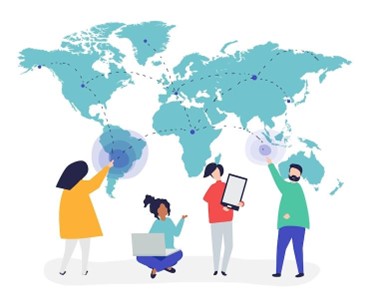
Image: Freepik
Lessons to learn by making games
By developing a guide on social entrepreneurship, we hope to not only teach about game development but also to inspire learners to get to know more about the world they live in. Games can be turned into a tool which breaks down abstract issues into more comprehensible systems that learners can play around with. By creating new scenarios, situations and designs, game development becomes a tool for understanding the world and learning about new perspectives. Unexpected insights can be gained, not just about video game creation, but also about issues that different groups in society may face. In this article, we will share some of the most important lessons you might learn along the way of game creation.
The world is built up out of systems
Once we decide to develop a game based on a social issue, it is necessary to dive into this issue and the complex system behind it. We have to imagine the conditions around the issue, the constraints the solutions might face, and the solutions that have already been tried. We model the system behind the social issue to imagine how we can best represent the situation. Imagine we are developing a game on soup kitchens. Not only is there the playful aspect we might want to incorporate, but there is also a lesson about poverty. Instead of just taking this poverty as a given, the creator will have to grapple with the larger issue of inequality. Who determines what characters are at the soup kitchen? Why these characters? What will it take to ‘’win’’? Through game development that includes real-world dynamics, creators begin to understand how invisible structures shape lived experiences.
Collaboration is a must
To develop a successful game, a team is needed. We can view it as a team sport, where each ‘’player’’ has a specific role to play. Working together across perspectives, disciplines, and sometimes even cultures is essential. This becomes especially true once the focus for game development is on social issues. Soft skills like communication and navigating conflict will be present, as each learner has a different approach to different issues. Different actors need to be involved here, as social topics require feedback from the audience to make sure the message comes across and representation is accurate.
Empathy is extremely valuable
While creating a game, we might face the challenge of having to represent the experiences of other people. It is important to consider how to best portray someone else’s experiences in the most responsible way. Games with a social focus might choose to highlight the experience of refugees or people with mental health issues. To do this as accurately and respectfully as possible, we have to do research and listen to experiences. Empathy cannot just be a feeling, but it needs to be put into practice when you decide to tell stories from the margins.
Ethics are at the forefront of every undertaking
When designing a game, it is also highly important to consider how ethical you want your game to be. Throughout the process, you will be confronted with various dilemmas that shape the core of your game. Is it ethical to include an element of winning in your game when it focuses on addiction? Should the game have addictive features that will keep the players hooked? If you are developing a game about conflict or war, how do you prevent violence from being glorified? How fun should your game be if the topic is sensitive? These are all tensions that creators face throughout the development process, requiring constant reflection.
At the end of the day, developing games to understand the world is not just a learning method; it is also a method that has the potential to affect your worldview. By focusing on social issues, learners are trained to see the complexity of the world, asking better questions while coming up with brand-new solutions. Whether learners end up wanting to get involved in game development or not, they will have acquired a deeper understanding of how systems shape the world and how they might shape it in return.
